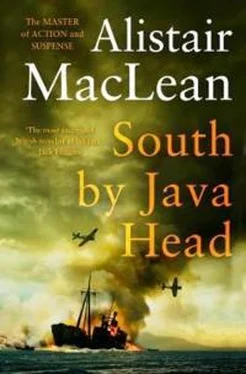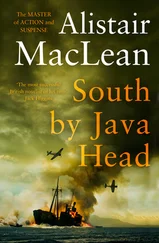Unhurriedly both men rose to their feet and inspected the lifeboats in the light of the torch. Number two, Siran’s boat, had been holed in several places, but all above the water-line, and she appeared to be making little or no water: several of her airtight tanks had been punctured, but sufficient were undamaged to provide a still reasonable margin of safety.
It was a different story altogether with number one, the motor lifeboat. If anything, even fewer random shots had pierced her hull, but she was already settled deeply, heavily in the shallow water, her floorboards covered. The water inside the boat was stained and streaked with red blood from the shockingly mutilated Japanese sailor who lay draped over the gunwale, and it was below this barely recognisable remains of a human being that Nicolson found the cause of the trouble. The same grenade that had blown off a hand and most of a face had also blown a hole clear through the bottom of the boat, shattering the garboard strake for eighteen inches of its length and the adjacent planks right up to the bilge stringer on the starboard side. Nicolson straightened slowly and looked at McKinnon in the backwash of reflected light.
“Holed,” he murmured briefly. “I could stick my head and shoulders through that gap in the bottom. Take us days to patch the damn’ thing.”
But McKinnon wasn’t listening. The beam of the torch had shifted and he was staring down into the boat. When he spoke, he sounded remote, indifferent.
“It doesn’t matter anyway, sir. The engine’s finished.” He paused, then went on quietly: “The magneto, sir: the grenade must have gone off just beneath it.”
“Oh, lord, no! The magneto? Perhaps the second engineer–”
“No one could repair it, sir,” McKinnon interrupted patiently. “There’s damn all left to repair.”
“I see.” Nicolson nodded heavily and gazed down at the shattered magneto, his mind dull and heavy with all the appalling implications that smashed magneto carried with it. “There isn’t very much left of it, is there?”
McKinnon shivered. “Somebody’s walking over my grave,” he complained. He shook his head slowly, stared down into the boat even after Nicolson had switched the light off, then touched Nicolson lightly on the arm. “You know something, sir? It’s a long, long row to Darwin.”
Gudrun was her name, she told him, Gudrun Jorgensen Drachmann, the Jorgensen being for her maternal grandfather. She was three parts Danish, twenty-three years old and had been born in Odense on Armistice Day, 1918. Apart from two short stays in Malaya, she had lived in Odense all her life until she had qualified as a nurse and come out to her father’s plantations near Penang. That had been in August, 1939.
Nicolson, lying on his back against the bank of the hollow, elasped hands beneath bis head and staring up unseeingly at the dark canopy of clouds, waited for her to go on, waited till she would begin again and hoped she would begin again. What was that quotation that old Willoughby, a hopeless, inveterate bachelor if ever there had lived one, had thrown at him so often in the past? “Her voice was ever soft” – that was it. King Lear. “Her voice was ever soft, gentle and low.” Willoughby’s stock excuse for avoiding the accursed snares – his own words – of holy matrimony: a female – Willoughby could invest that word with a wealth of scorn – with a voice ever soft, gentle and low – he had never found one. But maybe if Willoughby had been sitting where he’d been in the twenty minutes that had elapsed since he’d reported back to Findhorn and then come to see how the young boy was, he might have changed his mind.
Two minutes passed, three and she had said no more. By and by Nicolson stirred and turned towards her.
“You’re a long way from home, Miss Drachmann. Denmark – you liked it?” It was just something to say, but the vehemence of her answer surprised him.
“I loved it.” There was finality in her voice, the tone of someone speaking of something lost beyond recall. Damn the Japanese, damn that waiting submarine, Nicolson thought viciously. He changed the subject abruptly.
“And Malaya? Hardly the same high regard for that, eh?”
“Malaya?” The tone changed, was the vocal accompaniment of an indifferent shrug. “Penang was all right, I suppose. But not Singapore. I– I hated Singapore.” She was suddenly vehement, all indifference gone, and had no sooner shown the depths of her feelings than she had realised what she had done, for voice and subject changed again. She reached out and touched him on the arm. “I would love a cigarette too. Or does Mr. Nicolson disapprove.”
“Mr. Nicolson is sadly lacking in old world courtesy, I’m afraid.” He passed over a packet of cigarettes, struck a match and as she bent to dip her cigarette in the pool of flame he could smell the elusive sandalwood again and the faint fragrance of her hair before she straightened and withdrew into the darkness. He ground out his match into the soil and asked her gently: “Why do you hate Singapore?”
Almost half a minute passed before she replied. “Don’t you think that that might be a very personal question?”
“Very possibly.” He paused a moment, then went on quietly, “What does it matter now?”
She took his meaning at once. “You’re right, of course. Even if it’s only idle curiosity on your part, what does it matter now? It’s funny, but I don’t mind telling you – probably because I can be sure that you wouldn’t waste false sympathy on anyone, and I couldn’t stand that.” She was silent for a few seconds, and the tip of her cigarette burnt brightly in the gloom. “It’s true what I say. I do hate Singapore. I hate it because I have pride, personal pride, because I have self-pity and because I hate not to belong. You wouldn’t know about any of these things, Mr. Nicolson.”
“You know an awful lot about me,” Nicolson murmured mildly. “Please go on.”
“I think you know what I mean,” she said slowly. “I am European, was born in Europe, brought up and educated in Europe, and thought of myself only as a Dane – as did all the Danish people. I was welcome in any house in Odense. I have never been asked to any European’s house in Singapore, Mr. Nicolson.” She tried to keep her voice light. “A drug on the social market, you might say. I wasn’t a nice person to be seen with. It’s not funny when you hear someone say ‘A touch of the tarbrush, old man.’ And say it without bothering to lower their voice, and then everybody looks at you and you never go back there again. I know my mother’s mother was Malay, but she is a wonderful, kind old lady and–”
“Easy, take it easy. I know it must have been rotten. And the British were the worst, weren’t they?”
“Yes, yes they were.” She was hesitant. “Why do you say that?”
“When it comes to empire-building and colonialism we are the world’s best – and the world’s worst. Singapore is the happy hunting ground of the worst, and our worst is something to wonder at. God’s chosen people and with a dual mission in life – to pickle their livers in an impossibly short time and to see to it that those who are not of the chosen remain continually aware of the fact – the sons of Ham to be hewers of wood and drawers of water to the end of their days. Good Christians all, of course, and staunch pillars and attenders of the church – if they can sober up in time on the Sunday morning. They’re not all like that, not even in Singapore: but you just didn’t have the luck to run into any of the others.”
“I didn’t expect to hear you say that.” Her voice was slow, surprised.
“Why not? It’s true.”
“That’s not what I mean. It’s just that I didn’t expect to hear you talking like – oh, well, never mind.” She laughed, self-consciously. “The colour of my skin is not all that important.”
Читать дальше
Конец ознакомительного отрывка
Купить книгу










